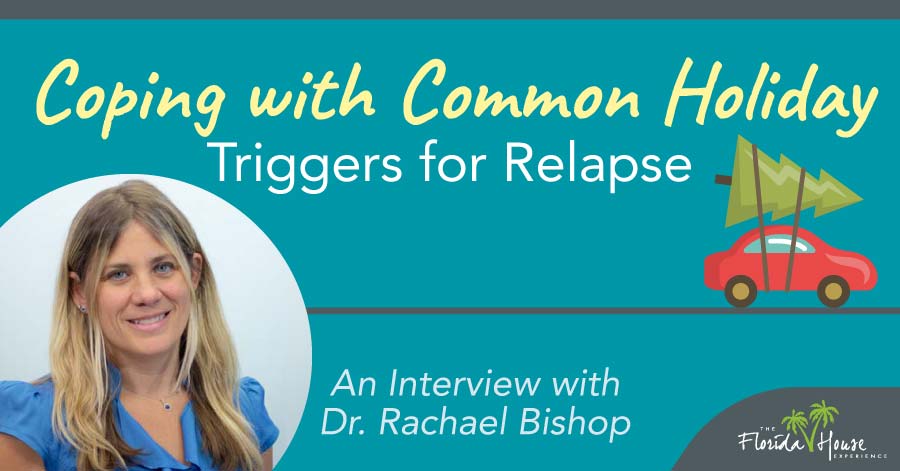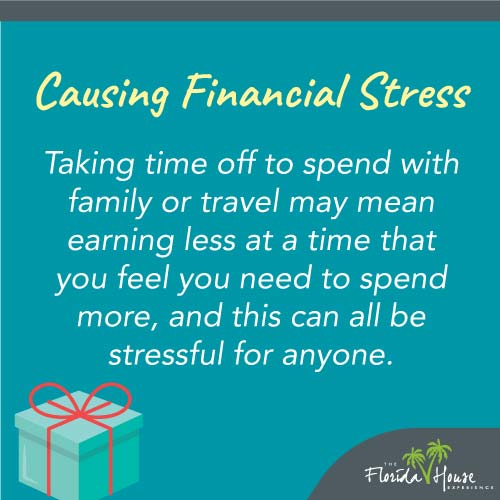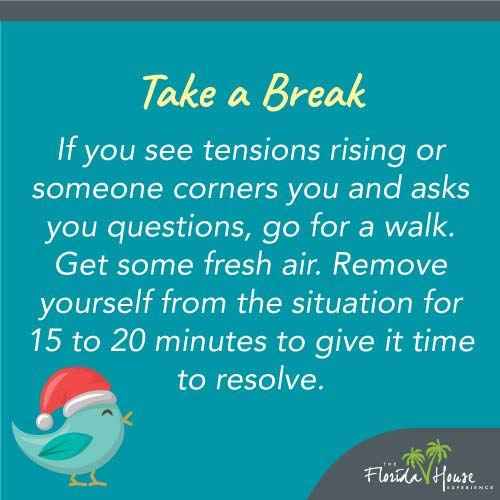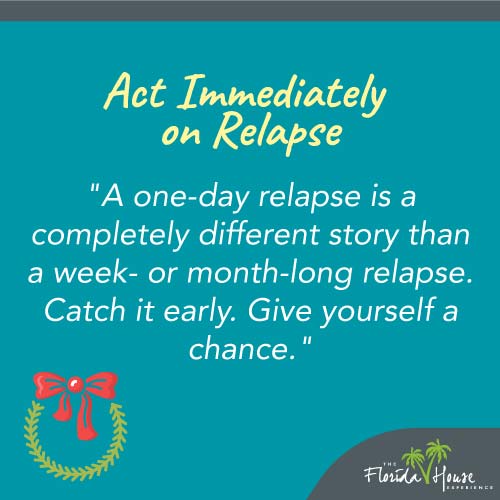
From the critical aunt who can’t stop asking you questions to the stress of attending holiday parties or finding the right gift for each person, the holidays can be difficult. According to Dr. Rachael Bishop, one or our Licensed Clinical Psychologists, the days and weeks around the holidays can be difficult for a lot of people. For those in recovery, these difficulties add a layer of abnormal stress that can lead to relapse.

Dr. Bishop says many people are much more likely to experience relapse during or around the holidays. But having a plan going into these weeks and understanding what triggers you may face can go a long way to helping you stay sober during the season.
Here, Dr. Bishop discusses what you need to know about the holidays if you’re in recovery. She also provides some tips for navigating some of these triggers.
Common Holiday Triggers for Relapse
“Holiday relapse is very, very closely tied in with mental health,” says Dr. Bishop. “Around the holidays, we see an increase in stress and stressors. We also see an increase in depression and related symptoms. There are a lot of really specific reasons for that.”
While every situation is unique, common holiday triggers fall into some broad categories.
Financial Stress
 “Holidays cost money,” says Dr. Bishop. “whether it’s gift buy and giving, entertaining, buying additional food for cooking. There’s an increased demand for cleaning and traveling, and a lot of times people have to ask off of work.”
“Holidays cost money,” says Dr. Bishop. “whether it’s gift buy and giving, entertaining, buying additional food for cooking. There’s an increased demand for cleaning and traveling, and a lot of times people have to ask off of work.”
Taking time off to spend with family or travel may mean earning less at a time that you feel you need to spend more, and this can all be stressful for anyone. Individuals may feel financially obligated in all these ways, so whether they spend the money or not, they face stressors.
Holiday Parties
Dr. Bishop points to work-related parties and other holiday gatherings, where alcohol is often present, as another common seasonal trigger. Many people may be drinking at these events, she says, and “that’s just an in-your-face that alcohol is around and other people are drinking.”
Even if alcohol was not a previous substance problem, this type of environment can trigger a lot of people to start with drinking. That may drive a relapse of other substances too.
Isolation or Loneliness
 Holidays are a time when some people feel isolation or loneliness more. Whether you’re separated from friends or family because of an inability to travel, you haven’t fully repaired those relationships during recovery yet or you’ve lost someone in the past, these losses may hit home during the holidays. Dr. Bishop notes that this is partly because we tend to think on traditions and past holidays and realize those same people are not with us.
Holidays are a time when some people feel isolation or loneliness more. Whether you’re separated from friends or family because of an inability to travel, you haven’t fully repaired those relationships during recovery yet or you’ve lost someone in the past, these losses may hit home during the holidays. Dr. Bishop notes that this is partly because we tend to think on traditions and past holidays and realize those same people are not with us.
Family Conflict
You’re not off the hook for triggers even if you can be with loved ones during the season. “You can have the best, closest family in the world and there will still be conflict,” says Dr. Bishop. It’s simply a side effect of spending all that extra time together.
Disruption of Routine
Taking off work, parties, family gatherings and other holiday events can cause a disruption of routine, which Dr. Bishop says can be a trigger for relapse in itself.
Unrealistic Expectations
Finally, just trying to live up to societal expectations (and failing) can trigger relapse. Dr. Bishop says this is tough for a lot of people because society paints an unrealistic picture of the season. “Commercials show everyone sitting around and happy. The songs say ‘it’s the most wonderful time of the year.’ I think we compare ourselves to these expectations — that this is supposed to be the best time of year — and that’s just not the case.”
Facing the Holidays During Recovery
It’s not impossible to get through the holidays during recovery, says Dr. Bishop. But you definitely need a plan.
In fact, that’s her top piece of advance for how to deal with most of these common triggers: Plan ahead. She calls it “throwing some anchors” — some grounded points you can grab on to when things get heavy during the holidays.
Planning Ahead With Anchors for the Holidays
- If you know ahead of time you’ll be by yourself during the holidays, she advises making plans to stay busy and engaged. Call your sponsor or a recovery buddy and plan to have dinner, see a movie or go to a meeting. Ensure you have some specific activities lined up that put you in the company of like-minded individuals.
- Minimize financial stressors by being realistic and making a budget. “Despite societal expectations,” says Dr. Bishop, “gifts don’t always have to have a monetary value. Get creative. Are there things you can make or do instead?” Whatever you plan to do for the season, she says to start with a budget and stick to it.
 Have an exit strategy for family or social events, even if you don’t think you’ll need one. Know exactly what you will do if triggers arise. You might share that plan with a trusted friend or family member who can help enact it or simply keep it in your mind. “An easy one is to take a walk,” says Dr. Bishop. “If you see tensions rising or someone corners you and asks you questions, go for a walk. Get some fresh air. Remove yourself from the situation for 15 to 20 minutes to give it time to resolve.” Even if you leave the event, don’t just leave to go home. Have a plan to call someone, such as a sponsor, to talk it out.
Have an exit strategy for family or social events, even if you don’t think you’ll need one. Know exactly what you will do if triggers arise. You might share that plan with a trusted friend or family member who can help enact it or simply keep it in your mind. “An easy one is to take a walk,” says Dr. Bishop. “If you see tensions rising or someone corners you and asks you questions, go for a walk. Get some fresh air. Remove yourself from the situation for 15 to 20 minutes to give it time to resolve.” Even if you leave the event, don’t just leave to go home. Have a plan to call someone, such as a sponsor, to talk it out.- Minimize disruption of routine by sticking to as many normal details as you can. Wake up and go to bed at the same time, try to keep up with daily exercise routines and diets. But if your routine does fall apart, Dr. Bishop says to remain calm and give yourself permission to try again tomorrow. Take it one day at a time.
- Finally, approach the season with realistic expectations. Know that this probably isn’t going to be the best Christmas ever, and that’s okay. “If I’m walking in with these high expectations,” says Dr. Bishop, “chances are I’m going to be disappointed and let down.” Do a self-check with what your expectations are and ask yourself what is realistic. Take time to talk to friends and family about these expectations and what might be realistic for this particular season.
FHE Health Is Here to Help
Whether you’re a family who sees someone struggling or relapsing during the holidays or you’ve relapsed (or feel close to doing so), FHE Health is here to help.
 “Florida House recognizes the potential for relapse,” says Dr. Bishop, “and has extensive programs for wellness, well-being, mental health, meetings, networking and how to find a more active alumni and sober living community. There’s no judgment here.”
“Florida House recognizes the potential for relapse,” says Dr. Bishop, “and has extensive programs for wellness, well-being, mental health, meetings, networking and how to find a more active alumni and sober living community. There’s no judgment here.”
She says that people sometimes relapse during the holidays but wait until the new year to enter rehab. But she encourages individuals to act immediately. “A one-day relapse is a completely different story than a week- or month-long relapse. Catch it early. Give yourself a chance.”
She offers the same advice for family members who want to help loved ones who are struggling with an addiction. The team at FHE Health is trained to offer education and coaching to family members who want to intervene or encourage their loved one to seek treatment. Those teams work with families for as long as it takes, even if that’s weeks or months before someone enters rehab.
“Pick up the phone and call,” says Dr. Bishop. “Whatever the case may be for you, there is something for you here.”






